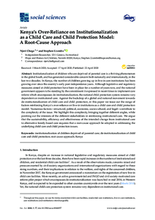Abstract
Institutionalization of children who are deprived of parental care is a thriving phenomenon in the global South, and has generated considerable concern both nationally and internationally, in the last two decades. In Kenya, the number of children growing up in live-in care institutions has been growing ever since the country’s early post-independence years. Although legislative and regulatory measures aimed at child protection have been in place for a number of years now, and the national government appears to be standing by the commitment it expressed in recent times to implement care reform which encompasses de-institutionalization, the national child protection system remains very dependent on institutional care. Against the backdrop of a global and national movement towards de-institutionalization of child care and child protection, in this paper we tease out the range of factors reinforcing Kenya’s over-reliance on live-in institutions as a child care and child protection model. Numerous factors—structural, political, economic, socio-cultural, and legal—contribute to the complexity of the issue. We highlight this complexity, bringing together different angles, while pointing out the interests of the different stakeholders in reinforcing institutional care. We argue that the sustainability, efficiency and effectiveness of the intended change from institutional care to alternative family-based care requires that a root-cause approach be adopted in addressing the underlying child care and child protection issues.
View article here.

